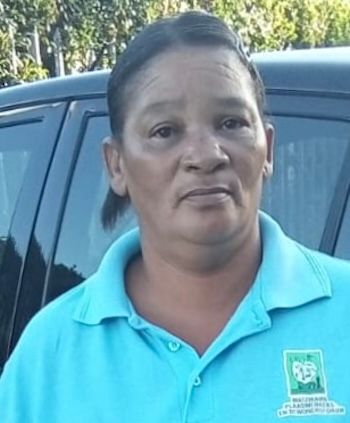Johanna Filander

Summary: Johanna Filander leads her community in championing labour rights, proper service delivery, skills development, and promotion of sustainable food security in Vanrhynsdorp, South Africa. In 2016, Filander became the chairperson of Mtzikama Farm Workers and Farm Dwellers Forum, a women-led organisation that aims to protect farm workers and farm dwellers within the Matzikama local municipality. Filander sometimes uses her own money to attend worker’s meetings. By challenging rich and powerful farm workers, Filander puts her life and that of her colleagues at risk, but she soldiers on, considering herself the voice of the voiceless, especially in a community where the rights of residents are suppressed.
Profile: When Johanna Filander realised that farm dwellers and farm workers had limited knowledge about their rights, “as the local farmer could expel and evict them without any explanation”, she committed herself to address their plight.
“At one time,” she says, “I saw the farmer evicting workers and taking their clothes and dumping them under the bridge, without any explanation. I started to ask [the workers] questions about their rights. They told me they don't know these rights . . . That is when my journey began.”
Her journey included becoming the chairperson of Mtzikama Farm Workers and Farm Dwellers Forum. Noticing the impact of hunger in working-class communities, Filander and her colleagues sought to secure access to land for community gardens, especially access for workers who were evicted from their farms and couldn’t find anywhere to work. Soon after that, when she saw some farm workers spraying pesticides without protective clothing, she initiated training workshops to educate them about the effects of chemicals and how to protect themselves and the environment from chemical effects. Recently, Filander and her colleagues trained 160 farm workers on environmentally sustainable and safe chemical use. They have also stood against abuse of farm workers by farmers. At times she has coordinated with Legal Aid to combat farmers’ actions. And at other times, they talk in the media and “tell the world how our farm workers are exploited.”
Filander’s work is not all that easy. Distance does not prevent her from standing in solidarity with farm workers and farm dwellers. She uses her own funds to travel to workers’ meetings. For example, “When an eviction takes place, no matter where in Matzikama, I hire someone to take me to the area, and they charge me R450 for transport.” A married mother of three, Filander spends most of her time organising, away from her family. Recently, when Filander arrived home from attending a conference of farm dwellers in Johannesburg, she discovered that her son had been injured at school, and the school had not taken measures to help him seek treatment. She discovered that this is how the principal treated students from poor households. Filander and her colleagues launched a campaign against the school for discrimination and negligence. She took the case to attorneys as well as the media; the principal faced charges.
Filander’s work demands that she challenge power. Politically connected and rich farm owners reportedly work with law enforcement to intimidate her, and police officers have threatened to arrest her on fictitious charges. She is often supported by community members:
“A group of police officers came to my house and told me that they received a complaint about the plants in front of my yard, and I must remove it. I asked them, ‘Before you came to me, did you really do your work? There are many plants in front of people's houses. Why mine? No, I will not do it.’ And they call someone I don't know. He tells them they must arrest me, because I don't want to give my ID number. I tell them I will walk to the station and we can take it from there. Members of the community join me.”
Despite these challenges, Filander is determined to continue her work, considering herself the “voice of the voiceless” in a community where people’s voices are suppressed.
